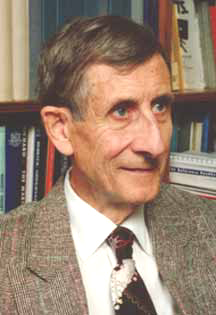 |
Technology and Social Justice May 9th, 2003 |
 |
| Freeman Dyson Institute for Advanced Study Princeton, New Jersy |
Renowned in science circles not only for his rigor and insight, but for his science fiction imaginativeness and populist ethics. |
Dyson is concerned about the future of mankind, both in the short term and in the very remote future. |
| Freeman Dyson has dedicated much of his life to advocating the development of “joyful and useful” technologies for the benefit of all humankind, regardless of economic or cultural situation. His insistence on using current emerging technologies as social equalizers — in much the same way that vaccines, antibiotics, and electricity helped bridge economic and social gaps in the 20th century — has put him at the forefront of scientists who call for eliminating the wedge that technology drives between the haves and have nots. Freeman J. Dyson, Professor Emeritus at the Institute for Advanced Study in Princeton, New Jersey, one of the world’s pre-eminent physicists, has consistently challenged humankind to reconcile technology and social justice. Dyson first rose to public notice at the age of 24 when he showed that a number of seemingly incompatible theories of quantum electrodynamics, which attempt to explain the interaction of electromagnetic radiation with matter, proposed by Feynman, Schwinger, and Tomanaga were, in fact, the same. In 1956 he worked with Edward Teller, father of the hydrogen bomb, at the General Atomic Division of General Dynamics Corporation, designing a nuclear reactor, and in 1958 joined the Orion Project, an effort to construct nuclear-powered space-ships. Dyson is known as a champion for the good science can engender. “Science is the most powerful driving force of change,” he wrote in Imagined Worlds. Yet, Dyson also acknowledges the limits of science in deference to spiritual guidance, which he says “has at least an equal claim to authority in defining human destiny.” This “long-range moral and social fallout of today’s scientific miracles” which fail “to produce benefits for the poor in recent decades is due to two factors working in combination,” he wrote in Imagined Worlds. “The pure scientists have become more detached from the mundane needs of humanity, and the applied scientists have become more attached to immediate profitability.” For many physicists, Dyson epitomizes original thinking. At the Institute for Advanced Study, the same center where Einstein worked, Dyson’s colleagues have coined the term “dysonian” to describe “ideas that crackle with originality the way that Dyson’s own ideas do,” according to a recent article in Business Week. |
He puzzles over the meaning of life, the purpose of the universe and the nature of God. In short, he is a philosopher in the broadest sense. Dr. Roger Penrose, New York Times Book Review |
 |